
Raising children is expensive. And with inflation rising, the cost keeps increasing. So since tax season is upon us, American families are probably wondering what kind of break they'll receive on their federal income tax. Luckily, there's now an expanded tax credit for taxpayers with children.
Tax Credit Increase
Video of the Day
There is an expanded Child Tax Credit for 2021. The last tax deduction for a qualifying child was $2,000. That has changed. The new tax credit is $3,600 for children ages five and under at the end of 2021. It's $3,000 for children ages six to 17 at the end of the tax year 2021.
Video of the Day
The maximum credit is allowed for filers with a designated income. The adjusted gross income (AGI) must be:
- Singles: $75,000 or less
- Heads of Household: $112,500 or less
- Married couples filing a joint return and qualified widows and widowers: $150,000 or less
For those individuals or families above the designated AGI, there are limited tax credits.
Consider also: Who Can & Can't Be Claimed as a Dependent on Tax Returns?
Fully Refundable Tax Credit
Before this new tax credit went into effect, those people who had a refund that exceeded their owed taxes didn't receive the difference. That has changed. Now, regardless of your income and if you qualify, the entire expanded credit is fully refundable.
A parent doesn't need to be employed to receive this credit. Before this tax credit expansion, it was required that you earn at least $2,500. That is no longer the case.
Eligibility is determined by AGI and residency in the U.S. The dependent child must also have a Social Security number.
Consider also: Tax Credit vs. Deduction: What's the Difference?
Now, regardless of your income and if you qualify, the entire expanded credit is fully refundable.
File Federal Income Tax Return
Since it's a fully refundable tax credit, it's important to file even if you don't typically file taxes. So, regardless of your income or filing status, go ahead and file a tax return to receive a tax refund.
It's not necessary to be employed or have an income. Fill out Form 1040 and Schedule 8812.
Filing is also essential if you didn't receive any stimulus checks last year. You'll want to file to claim for the missing stimulus checks so you receive the total amount.
Advance Monthly Payments
If you received monthly advance child tax credit payments throughout 2021, you are required to file to compare payments received with the amount you can claim.
Eligible families who didn't opt out received six monthly child tax credit payments from July through December 2021. These advance payments accounted for roughly half of the 2021 child tax credit and are not taxable. But if you received more than your income justified, you may have to pay some back.
But, if you didn't have an income or had a low income, you might be entitled to more of the tax credit than was already paid. So, it's important to file a tax return to receive the full amount.
The IRS mailed out Letter 6419 to those individuals who received the advance child credit payments. This letter stated the amount that you received in advance payments. When filing a tax return, be sure to enter the correct amount. Failure to do so could delay your refund.
The federal government may phase out advance monthly payments, but it hasn't been determined at this point.
Consider also: Can You Claim the Child and Dependent Care Credit?
17-Year-Old Child and Tax Credit
In the past, a 17-year-old dependent was not eligible for a tax credit. Prior to 2021, the child's ages were 16 years or younger. If a child meets all the other requirements and is 17, the child credit will now apply.
American Rescue Plan Act
This increase in child tax credit was part of the American Rescue Plan. According to WhiteHouse.gov, it was the largest child tax credit in the U.S.'s history.
The American Rescue Plan Act of 2021 also helped families that found it difficult during the coronavirus pandemic. The act provided funding for healthcare, assistance to individuals and families and other projects.
- IRS: 2021 Child Tax Credit and Advance Child Tax Credit Payments
- IRS: IRS: Expanded Credits for Families Highlight Tax Changes for 2021; Many People Who Don’t Normally File Should File this Year
- efile.com: Non-Filer or Social Security Income Recipient
- Kiplinger: Child Tax Credit FAQS for 2021
- White House: Major Tax Relief for Nearly All Working Families
- IRS: 1040 Form
- IRS: Credits for Qualifying Children and Other Dependents
- Kiplinger: Child Credit Payment Schedule for 2021